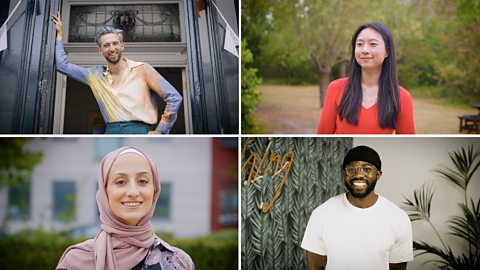Meet Charis, 20, a back of house assistant at Manchester United Football Club. Find out more about how they use British Sign Language in their role. Part of our Bitesize world of work series.
Charis is profoundly deaf in their right ear and moderately deaf in their left ear so relies on both British Sign Language (BSL) and spoken word to communicate with their colleagues. Having been diagnosed recently, Charis has found learning BSL has made a real difference to their everyday life.
I've been working at the club for about one year now and I've enjoyed it so much!
Charis:
Hi, my name is Charis, and I work at Manchester United’s football stadium as a back of house assistant.
So, I've been working at the club for about one year now, and I've enjoyed it so much. The people who I work with, like, they're great. They're so patient with me. I work in the main kitchen, in Manchester VIP kitchen. So, day to day, there are so many responsibilities that I'm given, and that includes ensuring that the whole kitchen is clean and tidy, helping the chefs whenever they need to be helped. I try to use British Sign Language everywhere I go, but when I work, I tend to speak and sign at the same time. That encourages the chefs and the staff to not be afraid to communicate with me, and there are no communication barriers. And because it's a loud environment, they tend to gesture for me and point to things, and that makes my life easier.
Charis’ colleague:
“Hi, can you get the big plates?”
Charis:
“Big plates?”
It’s a great environment and everyone is so patient with me. And when I told them I was deafand they were surprised at first but they adjusted to it really well. All of us have a great laugh, and at the end of the day, I go home happy.
I think the biggest challenge in my job is when new people come in and they don't know that I'm deaf. Sometimes it can take a while for them to process that I'm deaf, and especially when they wear a mask and they don't feel comfortable in taking it down. That's a massive issue sometimes. But later when they start to understand and it's fine after that.
About two years ago, I started British Sign Language and I started off with the induction course. After that, I progressed onto my Level 1 and moved onto my Level 2, and this year I'm starting my Level 3.
The application process was quite simple. I applied online and I walked in for my interview.The most important skills that the staff were looking for was responsibilityand how you would approach certain situations.
“Who am I working with on Sunday?”
Charis’ manager:
“With Atoga.”
When Charis applied for the job, we look at few skillset and they had all the skills required. They are very hardworking, very intuitive. All the staff love them.
Charis:
There aren't any specific qualifications that you need for this job, but there are key skills that the staff look for, and that can include time management and how you work well individually and in a team.
I wish I had known that I was profoundly deaf in my right ear from a very young age. I've always had issues with my hearing and growing up that was really difficult. I'm happy now that I've got my diagnosis, but it would have made my life easier if I had known many years ago.
Tips and advice I would give to people who want to learn British Sign Language would be to do your research online first.
Get yourself involved within the deaf community. You'll learn much quicker.
After that, please carry on with it. It's a useful skill to have in your life, and it's very beneficial.
- The main skills Charis uses as a back of house assistant include customer service, using your initiative, strong communication and the ability to remain calm in stressful situations
- Working in the main kitchen, Charis is given many responsibilities day to day, such as ensuring the kitchen is clean and tidy, as well as helping the chefs with anything they need
- Charis says the people they work with are really accommodating, patient and make themself feel at ease in the role
- Charis tries to use British Sign Language everywhere they go but at work they tend to speak and sign at the same time. This encourages the chefs and staff not to be afraid to communicate. As it's a loud environment to work in, they tend to gesture, which makes their life easier
- Charis says the biggest challenge of the job is when new people come in and they don't know they're deaf. It can take a while before they realise that Charis is deaf so it can be harder to communicate initially
- Charis started to formally learn British Sign Language when they were eighteen years old. They started with an induction course, before going on to complete the Level 1 and Level 2 courses. This year, they are starting their Level 3
- Applying for the job was a relatively simple process. Charis applied online and had an in-person interview, before being offered the role. They looked for skills in time management, taking on responsibility and how well Charis could work both individually and in a team.

Top tips
- When it comes to learning British Sign Language, do your research online first and find out what courses you can do. It can be challenging at first but be persistent, as it's a really useful skill to have in your life
- Get yourself involved in the deaf community, as you'll learn much quicker.

A back of house assistant can also be known as a kitchen porter or a kitchen assistant. They prepare food, make sure chefs have everything they need and keep the kitchen clean.
What to expect if you want to be a kitchen assistant
- Kitchen assistant average salary: £11,500 to £16,500 per year
- Kitchen assistant typical working hours: 40 to 42 hours per week
What qualifications do you need to be a kitchen assistant?
You could get into this role via a college course, an apprenticeship or applying directly.
Sources: LMI for All, National Careers Service
This information is a guide and is constantly changing. Please check the National Careers Service website for the latest information and all the qualifications needed.
For careers advice in all parts of the UK visit: National Careers Service (England), nidirect (Northern Ireland), My World of Work (Scotland) and Careers Wales (Wales).

Taran: a writer and translator. video
Taran translates Cornish material into English and runs workshops.

How I use modern languages in my career. collection
Find out more about careers that use modern languages.

Maddy: a social brand manager. video
Maddy manages anything to do with social media for L'Oréal.
